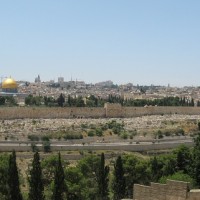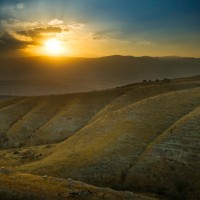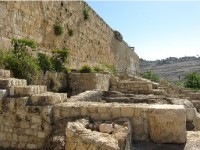Luke 11:1 One day Jesus was praying in a certain place. When he finished, one of his disciples said to him, “Lord, teach us to pray, just as John taught his disciples.” 2 He said to them, “When you pray, say: ‘Father, hallowed be your name, your kingdom come’…9 So I say to you: Ask and it will be given to you; seek and you will find; knock and the door will be opened to you. 10 For everyone who asks receives; he who seeks finds; and to him who knocks, the door will be opened. …13 If you then, though you are evil, know how to give good gifts to your children, how much more will your Father in heaven give the Holy Spirit to those who ask him!”
I think Jesus was a really interesting guy. He didn’t do the expected.
His disciples have just watched and possibly even listened to Him pray. Yet, when He was done, they asked Him to teach them to pray just as John [the Baptist] taught his disciples. It wasn’t, “Lord, teach us how to pray like we just saw you do.” Why “just as John [the Baptist]”? Were the disciples trying to keep up with the Joneses or the Baptists? Was their desire for earthly hills, methods of prayer, or even a liturgical prayer that was “The Jesus Brand” since John’s followers had “The Baptist Brand”? They were in the presence of Jesus–Emmanuel, God with us! Why were they looking at earthly hills instead of gazing beyond them to the presence of God Himself?
He took the whole rod of comparison–hook, line, and sinker–and then the entire earthly tackle box of prayer. In its place, He gave them (and us) the most heavenly perspective on seeking the presence of our holy and powerful God.
He genuinely taught them how to pray.
Just like Martha learned in yesterday’s lesson: Seek God’s presence; listen to Jesus; and whatever you truly need to serve Him will be given to you. Daily bread—given! Forgiveness and mercy—given! The ability to forgive others—given! Protection from opposition—given!
Jesus gives a few practical examples reinforcing the priority of seeking God’s presence and then He drops the most amazing statement on them in verse 13:
“If you then, though you are evil, know how to give good gifts to your children, how much more will your Father in heaven give the Holy Spirit to those who ask him!”
The Holy Spirit’s previous activity in Luke’s gospel involved preparing the way and pointing to Jesus as the Son of God, Savior, and Messiah. The Holy Spirit was now being offered to disciples of Jesus who ask God, in prayer, for God’s ongoing presence with them…even as Jesus heads “Up to Jerusalem” to His death. Just amazing!
Jesus says, many good gifts come to people who don’t deserve them—it’s how God shows grace toward our physical needs. But the heavenly perspective is that God knows what we need most is His presence, not things. Matthew 6:33 “But seek first his kingdom and his righteousness, and all these things will be given to you as well.”
To those who were already on a journey “Up to Jerusalem” with Jesus Christ, praying like Jesus involves a priority act of worship: coming into the very presence of God, inviting His Kingdom to come, and boldly asking that He will meet our deepest needs through His ongoing presence and through this, satisfying our lesser needs—both by His grace.







 For the disciple experiencing fatigue, rejection, disappointment, or suffering, there is no greater source of encouragement than knowing that God is watching over you and goes with you. He’s watching over your safety and providing for you.
For the disciple experiencing fatigue, rejection, disappointment, or suffering, there is no greater source of encouragement than knowing that God is watching over you and goes with you. He’s watching over your safety and providing for you. The Samaritans didn’t like the Jews very much. They especially didn’t like them when they were heading to Jerusalem for the feasts. Samaritans believed the presence of God was at Mount Gerizim, not in Jerusalem and the Jewish insistence otherwise by these pilgrims showing up made the Samaritans angry.
The Samaritans didn’t like the Jews very much. They especially didn’t like them when they were heading to Jerusalem for the feasts. Samaritans believed the presence of God was at Mount Gerizim, not in Jerusalem and the Jewish insistence otherwise by these pilgrims showing up made the Samaritans angry. When I was in elementary school, we had music class and would sing songs. Isn’t it interesting how a song from decades ago can still be memorable? One song popped into my head instantly as I was thinking of pilgrims singing on their journey: The Happy Wanderer. The lyrics went, “I love to go a-wandering, along the mountain track. And as I go, I love to sing. My knapsack on my back.” The chorus was always our favorite: “Val-deri,Val-dera,Val-deri,Val-dera-ha-ha-ha-ha-ha.” We especially liked the ha-ha part and sang it with gusto even if the words were total gibberish.
When I was in elementary school, we had music class and would sing songs. Isn’t it interesting how a song from decades ago can still be memorable? One song popped into my head instantly as I was thinking of pilgrims singing on their journey: The Happy Wanderer. The lyrics went, “I love to go a-wandering, along the mountain track. And as I go, I love to sing. My knapsack on my back.” The chorus was always our favorite: “Val-deri,Val-dera,Val-deri,Val-dera-ha-ha-ha-ha-ha.” We especially liked the ha-ha part and sang it with gusto even if the words were total gibberish. The discipleship lessons taught by these Songs of Ascents were well remembered, too. Psalm 120 is the first Song of Ascents and might be titled, “Discipleship Lesson 1: Expect Opposition.” Not exactly The Happy Wanderer as a subject for Psalm 120. So why start here?
The discipleship lessons taught by these Songs of Ascents were well remembered, too. Psalm 120 is the first Song of Ascents and might be titled, “Discipleship Lesson 1: Expect Opposition.” Not exactly The Happy Wanderer as a subject for Psalm 120. So why start here?
